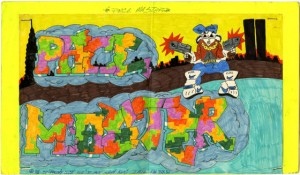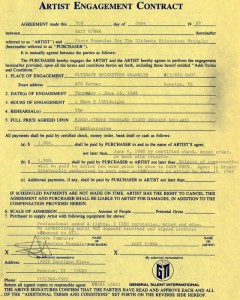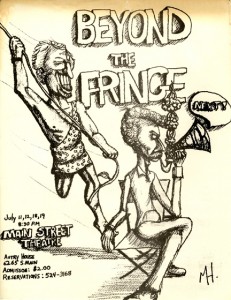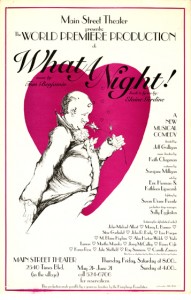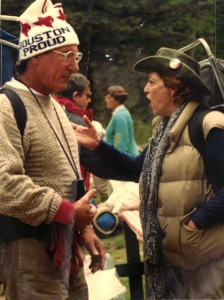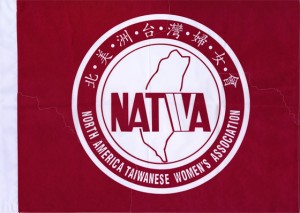
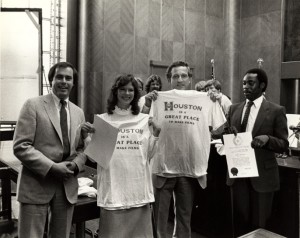
“Houston is a Great Place to Make Films” / from the production of Adam, pictured left to right, Steve Moore of GHCVC, Jo Beth Williams, Daniel J. Travanti, and Melvia Tennant of GHCVC (1983) / photo by Marianita Paddock, Paddock Greater Houston Convention & Visitors Council Records
The University of Houston Special Collections is proud to announce the recent publication of the Paddock Greater Houston Convention & Visitors Council Records finding aid.
These papers of Mildred and Harold Paddock show research potential in relation to their documentation of work conducted by the the Greater Houston Convention & Visitors Council, with most materials coming from the time their daughter, Marianita Paddock, worked with the GHCVC. The first series in this collection deals specifically with these types of materials, containing correspondence, speeches, press releases, and other promotional publications. Particularly interesting is a look into Houston’s late twentieth century development as a destination for large and small screen productions via the sub-series “Film in Houston,” containing press releases, industry journals, production schedules, and photographs capturing behind-the-scenes glimpses of productions, the city, and the iconic locales used in filming (predominantly from the 1980s). Among the films documented in the records are Middle Age Crazy (starring Bruce Dern), Adam (based on the true story of Adam Walsh’s kidnapping), and Murder at the World Series (which counted the Astrodome among its filming locations).
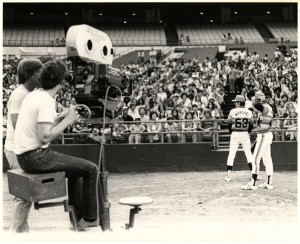
Filming Murder at the World Series (1976) / photo by George Wilkins, Paddock Greater Houston Convention & Visitors Council Records
The second series in this collection contains memorabilia related to the city of Houston and the state of Texas at-large, including bulletins, mailers, programs, and tickets collected by the Paddocks predominantly from the mid to late twentieth century. Of particular interest, and included among these materials, is a recording of the moon landing from 1969.
These materials, further expanding our larger Houston & Texas History Collection, are available for study in the Special Collections Reading Room during our normal summer hours. We look forward to seeing you and assisting you in your research!
The University of Houston Special Collections is excited to announce that findings aids are now available for the DJ Steve Fournier Papers and the Carlos “DJ Styles” Garza Papers. These two new additions to the Houston Hip Hop Collections provide a glimpse into the early days of hip hop in Houston through the work of two pioneering DJs.
Steve Fournier DJed at prominent Houston clubs like Struts Disco, the Boneshaker, and the Rhinestone Wrangler throughout the 1980s and 1990s, steadily adding more and more hip hop to his mixes and helping to organize live rap performances. He also founded the Rap Pool of America in 1985, which eventually became the largest rap record pool in the country, sending out the latest hip hop albums to over 200 member DJs. His collection contains documents, photographs, publications, and memorabilia relating to his work. Of particular note is the Rap Performer Contracts series, which contains performance contracts for several prominent rappers, including Eazy-E, N.W.A., Sir Mix-A-Lot, Public Enemy, and Ice-T.
Carlos “DJ Styles” started out as a break dancer with the group The Dynamic Crew, performing under the name DJ Pace Master. Shortly thereafter he began DJing under the name DJ Styles, and eventually became a successful hip hop music producer, working with artists like The Odd Squad, Devin the Dude, and the Coughee Brothaz. He continues producing, mixing, and mastering hip hop music to this day. This collection includes personal records, fliers, posters, photographs, business records, audiocassettes, and memorabilia from throughout his career. My personal favorites are the hand-drawn fliers from his early days break dancing with The Dynamic Crew.
Both of these collections are worth a look, so browse through the finding aids and then stop by and visit us at Special Collections!
The University of Houston Special Collections is excited to announce that the finding aid for the Main Street Theater Records has been published and is now available online!
Main Street Theater has been an important part of Houston’s vibrant performing arts community for almost forty years. Led by founding director Rebecca Greene Udden, the company staged their first production in the summer of 1975. As the name suggests, their first home was located on Main Street at Autry House, a community center belonging to the Episcopalian Diocese. The theater has grown steadily since then, first moving into a larger 92-seat space on Times Boulevard in Rice Village in 1981, and later adding a second, even larger, Chelsea Market location. The Main Street Theater is currently in its 39th MainStage season and its 34th Theater for Youth Season.
The Main Street Theater Records provide insight into the company’s activities both on stage and behind the scenes. The first 12 boxes of the collection consist of materials like playbills, scripts, posters, flyers, and photographs, documenting the theater’s MainStage productions as well as productions that are part of its Theater for Youth program. The collection also contains substantial amounts of financial records, meeting minutes from the Board of Directors and various other committees, donor correspondence, and materials related to the planning of benefits and fundraisers.
Take some time and peruse the finding aid, or better yet come visit us at Special Collections and see the history of this Houston theater for yourself!
The University of Houston Special Collections is excited regarding the continued growth and development of the Carey C. Shuart Women’s Archive and Research Collection as we have recently published new finding aids for both the Harriett Joan Ehrlich Papers and the North American Taiwanese Women’s Association Records.
Harriett Joan Ehrlich devoted 24 years of her life to the Equal Employment Opportunity Commission (EEOC), eventually becoming director of the Houston office and, later, San Francisco. Prior to her pioneering work at the EEOC, work that was both proactive and aggressive in seeking out unfair and unequal labor practices, she earned her stripes as a civil rights activist in her younger years. A tireless fighter to the end, she succumbed to her battle with leukemia in 2008 at the age of 72. Harriett Joan Ehrlich’s Papers focus significantly on her time and work with the EEOC as well as correspondence and personal writings.
Under the guidance and counsel of Annette Lu, the North American Taiwanese Women’s Association (or NATWA) was established in 1988. The Association was founded by Taiwanese women in the U.S. and Canada in part to establish a network of support for Taiwanese women living in the West, provide an independent organization to represent their interests, and preserve their cultural heritage. In 2000 NATWA became an overseas collaborating organization of the World Taiwanese Congress and continues to work both globally and locally on a number of projects, including the administration of programs like the NATWA Scholarship Program and the Caring for Soldiers initiative. The majority of the materials from the NATWA Records are in Taiwanese and highlights include photo albums and scrapbooks as well as official NATWA publications.
We encourage you to visit Special Collections to view these materials in their entirety and remind you that the “Collective HER-story” exhibit continues to be on display, featuring artifacts from both of these collections. It makes for a perfect time to drop by the Special Collections Reading Room and also take in this wonderful exhibit of the far-reaching Carey C. Shuart Women’s Archive and Research Collection.
Finding Aid for the Cynthia Macdonald Papers Now Available Online
What does it mean to live the Writer’s Life? We often hold to the stereotype of the solitary writer, alone among her books in a cramped apartment above a laundromat or a Greek restaurant, hammering away at the keyboard (or better yet: typewriter) to the strains of the city outside her window, the cacophony of sirens and taxicabs and nightclub jazz and the whistle and scream of anguished souls on the streets below. Or the even more hermit-like author, tucked away in a mountain cabin, sitting in a rocking chair he carved himself while ruminating on the beautiful mysteries of Mother Nature and the folly of humankind.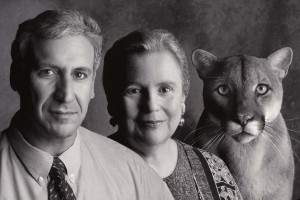
But there is another way, and Cynthia Macdonald, co-founder of the UH Creative Writing Program, has lived it. The Writer’s Life can be one that is fully engaged with the world around her. The writer can laugh and cry and struggle and celebrate with an unrelenting vigor. The writer can draw people into her orbit; can follow her curiosity down myriad paths to become an eclectic expert; can live firmly on the ground in the real world and turn its drudgeries and heartbreaks and ecstasies into Art.
The finding aid for the Cynthia Macdonald Papers is now available online, and the collection is a treasure trove for researchers, writing students, fans of Macdonald’s poetry, and anyone interested in seeing how a writer makes a go of it in this world.
Special Collections houses more than 45 boxes of Cynthia Macdonald’s work and personal materials. The collection includes multiple drafts of her 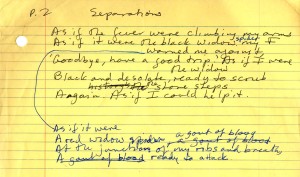 poems, both published and unpublished, both typed and handwritten, from scrawls on paper napkins and backs of envelopes to fully polished manuscripts. In addition to Macdonald’s writings, the collection also highlights the business and publicity surrounding a modern writer: contracts and royalty statements; writing proposals, grants, and awards; news clippings, book reviews, and poetry readings.
poems, both published and unpublished, both typed and handwritten, from scrawls on paper napkins and backs of envelopes to fully polished manuscripts. In addition to Macdonald’s writings, the collection also highlights the business and publicity surrounding a modern writer: contracts and royalty statements; writing proposals, grants, and awards; news clippings, book reviews, and poetry readings.
The abundance of correspondence is especially rich, featuring letters to and from Macdonald’s writing friends, teaching colleagues, and family members. Among the many noteworthy contributors are famous poets and writers such as Louise Erdrich, James Michener, Adrienne Rich, and Anne Sexton, as well as artists in other fields such as painter Helen Frankenthaler, photographer Gay Block, and singer Judy Collins.
The collection also provides a window into Macdonald’s long career as co-founder and teacher at UH’s acclaimed Creative Writing Program; her early, budding career as an opera singer; and her later, successful career as a professional psychoanalyst. The diligent researcher can also piece together other aspects of Macdonald’s life from a vast array of personal and family mementos and photographs, collected over almost the entire course of her life, from early childhood onward.
For more information about what is contained in the collection, be sure to take a look at the detailed finding aid. The original materials can be viewed in the Special Collections Reading Room.
So, what does it mean to live the Writer’s Life – or any life, for that matter? One way is to hunker down, hole up, and protect one’s writing and one’s heart in the safety of one’s own company, alone, but safe, but alone. Another way, though, as Cynthia Macdonald has demonstrated, is to reach out for all of life, to embrace life fiercely and expressly, to share bravely our thoughts and opinions and hearts with others, to write and live and write again and live some more, to dare to engage every aspect of the world around us, opening ourselves to the possibility of pain, yes, but to that of love as well.
